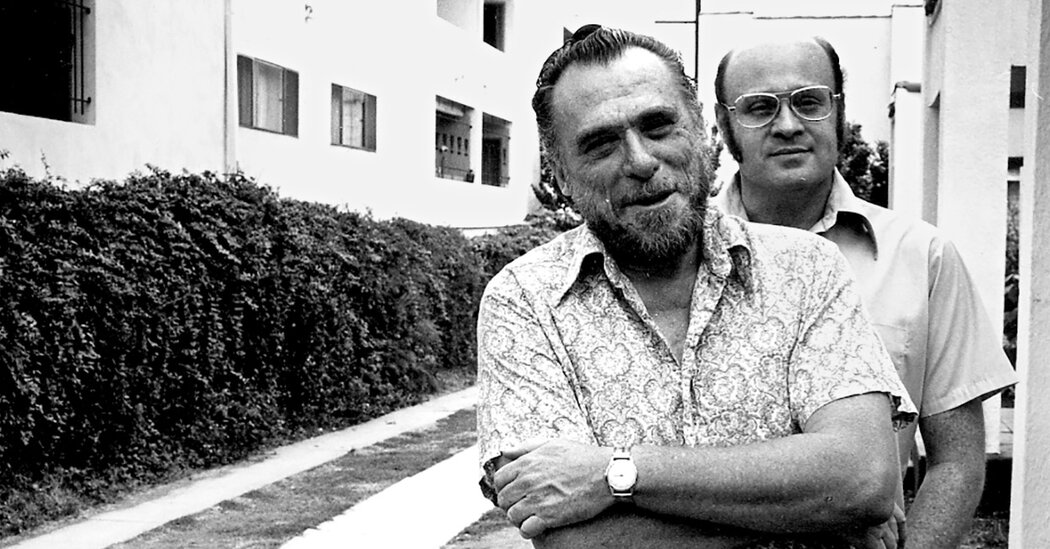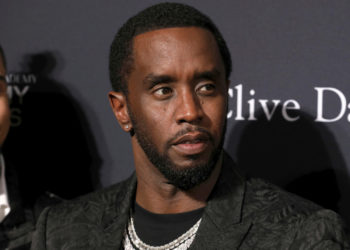John Martin, an adventurous independent publisher who brought out the raucous work of the poet Charles Bukowski, as well as the writing of other offbeat literary rebels like Paul Bowles, John Fante and Wyndham Lewis, died on June 23 at his home in Santa Rosa, Calif. He was 94.
His death was confirmed by his wife, Barbara Martin.
In 1966, Mr. Martin founded Black Sparrow Press, a shoestring operation that he ran out of his home for years with the help of part-time assistants and Ms. Martin, who designed the books. The company eventually became one of the highest-profile small publishers in the United States — “California’s premier literary publisher,” The Los Angeles Times called it — and in 2002 he sold it to an imprint of HarperCollins for seven figures.
In between, Mr. Martin promoted, encouraged and printed the vast, uncompromisingly demotic and self-reflexive work of Bukowski, a West Coast cult figure who drew hundreds to his readings and whose books were reportedly among the most stolen from bookstores.
Using language and form that were deliberately pedestrian, Bukowski made himself his subject — his drinking, womanizing and violence. He was the poet as “an unregenerate lowbrow contemptuous of our claims to superior being,” the critic Thomas R. Edwards wrote in The New York Review of Books.
Mr. Martin founded Black Sparrow explicitly to publish the work of Bukowski, whom he idolized, he told interviewers. In 1969, Bukowski was living a semi-down-and-out existence, working the night shift at a Los Angeles post office and squeezing in writing during his waking hours.
Mr. Martin was already a fan, having read Bukowski in underground newspapers like Open City and The Los Angeles Free Press. As the manager of a large office supply store in Los Angeles, he had access to a printing press and had published what he called “broadsides” of Bukowski’s poetry, which he distributed to friends.
He offered Bukowski a deal: He would guarantee him an income of $100 a month if the poet would quit his post office job and write full time for Black Sparrow. The idea was to free him from “drudgery,” Mr. Martin told an interviewer in 2020.
“I mean, we sat down one day and he got out a little piece of paper and gave it to me, and I took a pen and he gave me his expenses,” Mr. Martin said. “His rent was $35 a month. He had $15 a month child support. He wanted $15 a month for booze and food. He needed another $10 a month for car insurance and gas. When we added it all up, it came to $100. I said, ‘You can really live on $100?’ And he said, ‘Yeah.’”
Dozens of Bukowski books followed, including the novels “Women” (1978) and “Pulp” (1994), the short-story collection “Hot Water Music” (1983) and the poetry volume “The Roominghouse Madrigals” (1988). The flood continued long after his death in 1994 at 73, guaranteed by the large volume of his unpublished work.
“He would probably have died a lonely death from liver failure, surrounded by a mountain of paper containing unread and unpublished poems — not forgotten, because never known — were it not for John Martin,” the radio show host and writer Bill Press wrote in an unpublished manuscript about Bukowski.
Mr. Martin had “80,000 books by Bukowski, Fante and Bowles” in his inventory, he told The Los Angeles Times in 2002. Many were by Bukowski.
Mr. Martin remained convinced of Bukowski’s worth. He would be “as well thought of in 50 years as Walt Whitman is now” he said in an interview for “Bukowski: Born Into This,” a documentary film released in 2003.
It was precisely Bukowski’s instinct for the lowbrow that guaranteed his immortality, Mr. Martin said. “He’s the butt of every joke,” he said in the documentary. “He doesn’t turn on people and make them look stupid. Bukowski is neither wise, smart nor cool. He’s us.”
He added, referring to the title of the writer’s 1982 novel: “He’s the Ham on Rye.”
John Martin was born John Kiel Levy on Oct. 30, 1930, in San Francisco, one of four children of Theodore and Ruth (Kiel) Levy. His father was a maritime lawyer.
When John was 9, his father was killed in a car crash, and the family moved to Los Angeles, where his mother changed their surname to Martin.
After attending Beverly Hills High School, he enrolled at the University of California, Los Angeles, but soon dropped out, mostly because he had to help support his family, but also, he later explained, because the modernist writers he admired, like D.H. Lawrence and Wallace Stevens, were not being taught.
He went to work in the office supply store, soon becoming manager, and began collecting first editions of work by writers he admired, including Henry Miller, with whom he began a correspondence.
That collection spawned Black Sparrow: He sold the books in 1965 to the University of California at Santa Barbara for $50,000 and started the publishing company, continuing to work at his office supply job during the day and devoting his evenings to Black Sparrow. By 1969, he was able to quit his job, enlist Bukowski and other underground lights of American poetry, including Robert Creeley, and work 80 hours a week out of his small Los Angeles apartment.
“He read a lot of different people in the beginning, and then it just grew,” Ms. Martin said in an interview. “I sat at the dining room table and designed the books.”
In addition to Bukowski, Mr. Martin published early works by Joyce Carol Oates — nine novels by 1980 — and others who fit his offbeat modernist aesthetic, including John Ashbery and the Berkeley poet Ron Loewinsohn.
He published Paul Bowles’s “Things Gone and Things Still Here” (1977) and “Collected Stories” (1979), among other works by that author, many of them reprintings. And he republished the British writer and artist Wyndham Lewis’s “The Complete Wild Body” (1982) and “The Apes of God” (1981). Both authors held some of Bukowski’s appeal: writers disgusted with bourgeois society and intent on subverting it.
Mr. Martin also revived the fortunes of the 1930s Los Angeles novelist and screenwriter John Fante, republishing, in 1980, his 1939 classic of L.A. lowlife, “Ask the Dust,” with a foreword by Bukowski.
By the time the writer Richard Kostelanetz visited Mr. Martin in 1980 for an article in The New York Times Book Review, Mr. Martin had moved into a spacious villa in Santa Barbara. Black Sparrow, which was operating out of the pool house, was grossing $500,000 annually and bringing out 15 new titles a year.
Mr. Martin didn’t advertise, and he didn’t hold meetings with salesmen.
“Since I am a totally literary person, I have no desire to publish anything in any other area,” he told Mr. Kostelanetz. “I want to die never having been to Las Vegas, gone to Disneyland or watched a whole TV show, except for sports.”
In addition to the sale of Black Sparrow to HarperCollins in 2002, Mr. Martin sold his backlist, his inventory of 96,000 books and his contracts with living authors to the Boston literary publisher David Godine for $1.
Besides his wife, whom he married in 1959, Mr. Martin is survived by a daughter, Carrie A. Martin.
“He never published anyone because they would sell,” Ms. Martin, his wife, said. “He published them because he liked their work.”
Adam Nossiter has been bureau chief in Kabul, Paris, West Africa and New Orleans, and is now a Domestic Correspondent on the Obituaries desk.
The post John Martin, Devoted Publisher of Literary Rebels, Dies at 94 appeared first on New York Times.




